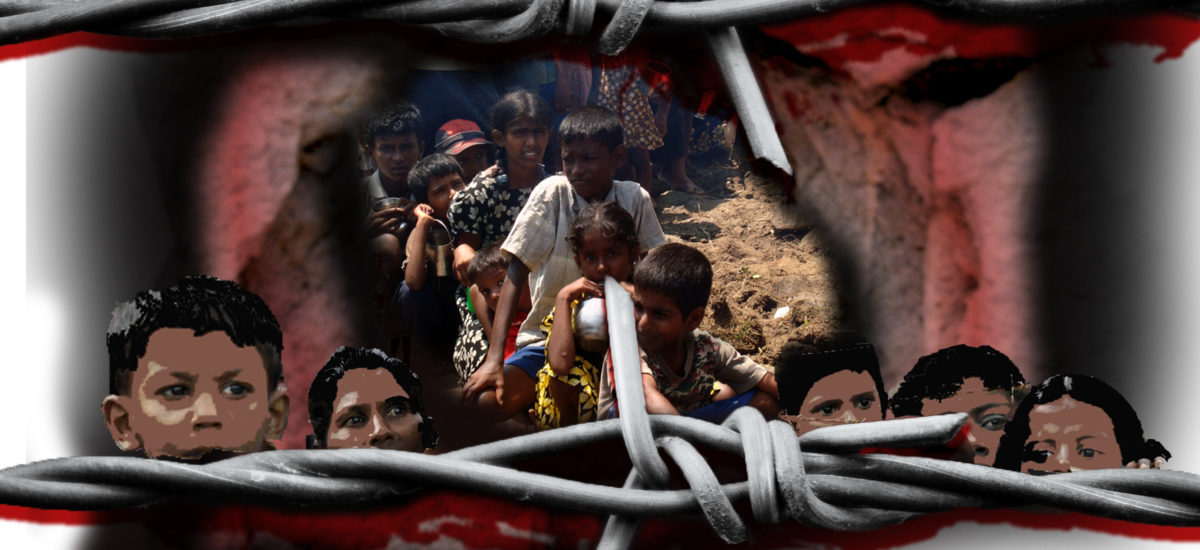Photo courtesy of Inthusan Pararajasingam
“Unknown Pains”, five short stories by peace builder Anojitha Sivaskaran describe events from her experience of the last phase of the war in May 2009, written in an attempt to create collective emotional healing and to promote dialogue and awareness on peace and unity among divided communities. Anojitha was 14 when the war ended.
Unsalted Porridge
“Where do you suppose they must be serving porridge today?”
Most of their mornings dawn with this question. Waking early, standing in line, pot in hand – that steaming hot unsalted porridge-water with grains of rice barely to be found. Indeed it was precious ambrosia to the helpless.
“Those in the neighboring cottage gave their motorbike for five coconuts, it seems.” A myriad incidents like this.
“If you fill a plastic bottle to overflowing, close it tightly and heat it, then the bottle won’t melt, later we use the hot water for making tea in the morning.”
Unsalted porridge, roasted Mullivaikal sprats, Silver date palm leaf, pittu without scraped coconut, “Vaipan” flour ball…these were things that our people came up with to survive and eat.
Note: During the last war, people had gone through several displacements and carried limited things while moving to other place. Because food shortage, they took maximum efforts to buy ingredients by exchanging expensive items they have, find alternative ways to cook, utilize available ingredients and wait in long ques to get milk powder and sugar.
Child! Give me some water, will you?
I was running, walking and following my mother, carrying whatever bags my little hands could bear. Bombs were falling in the distance. Amid all that commotion a voice that cried out loud “CHILD! Give me some water, will you…?” I turned toward the direction from which that voice seemed to be coming.
A young woman lying below a machine box stationed by the roadside, severely injured, crying. Blood flowed down from the bandages wrapped around her abdomen.
I hesitated. Suddenly, I felt my hands being grabbed and being told as I was led away, “Looks like an injury caused by shelling. If her stomach is wounded she mustn’t be given water. Let’s go! Let’s go”. I crossed over that day.
But…even today, the question of what would have happened that women gnaws at me inside.
Barrel
War time…
The struggles encountered after the inhabitants of two vast districts Kilinochchi and Mullaitivu were displaced and finally gathered into four villages, were not few. Shell attacks. Death. Severe hunger. Beyond these though, nature never missed a beat. It didn’t matter so much for men – they could hide away on the side of the road. But poor women. That in itself was a big struggle.
That being said, a toilet was like a luxury for people who had to live under a tarpaulin tied to sticks.
At such times, these barrels were what came to our rescue. These barrels were what protected our dignity. We would cut these blue plastic barrels in half. Every morning, we would have to go to the beach before dawn. If not, that day might turn out to be quite challenging. Like fireflies in the night sky, these plastic barrels sprouted up early in the mornings on those beaches.
Only those barrels know the pain and the lives of the people who lived there!
A Bunker Story
We were passing by Mullivaaikaal. The shell attacks began abruptly. We knew the bombs would fall on this side when the aircrafts passed.
My mother dragged us both into a nearby bunker and seated us there. It was a small open bunker. Many people started coming towards it. In that cramped space, an infant in the hands of a young woman started crying. She had two younger brothers alongside her. A few others too.
All of a sudden, my mother stood up and pointed towards another bunker just 15 to 20 feet away. “Let’s go there. This one’s too crowded,” she said and we went there.
Not even 5 minutes later, a deafening blast!!
“Iyo Pillaiyarappa!” I shouted as I shut my ears and bent down.
That bomb had fallen into the bunker from which we had just left. All I could see there was blood and flesh.
That young woman…the crying infant…the two young boys…a grandmother…that man with the big belly. I couldn’t spot any of them. Where did they all go?
Come in the Queue
Welfare camp. Its name was good, but that life was hell. Countless numbers of people behind barbed wires, waiting every day for someone to come and rescue them out of that hell.
Life was confined to a tarpaulin tent donated by some relief organization. The struggles would start as soon as you woke in the morning. Those NGOs would come and give us food parcels or balls of Samaposha wrapped in polythene lunch sheets. After waiting in line for two hours, each person would get only one parcel. I would get that, hand it over to my mother and run to join the next queue to get one for my sister. Standing in queue like this for all 3 meals.
There was a queue even to use the toilets. Within less than a minute of entering the toilet, the others in the queue would start knocking on the door and shouting “Come out soon…”. A queue for drinking water. You had to quickly fill your pots and buckets early in the morning from the water pumped from the tanks. If not, you would have no water that entire day. Sometimes, the army would often instruct everyone in the camp to get into queues for security checks.
Once in a blue moon, a lorry would come with essential goods. We were given a thousand rupees, with which we could buy a packet of milk powder, a little sugar, a pot. Even there, a man standing on the roof of the lorry shouts out …
“Come in the queue.”
These artworks were created by Inthusan Pararajasingam


